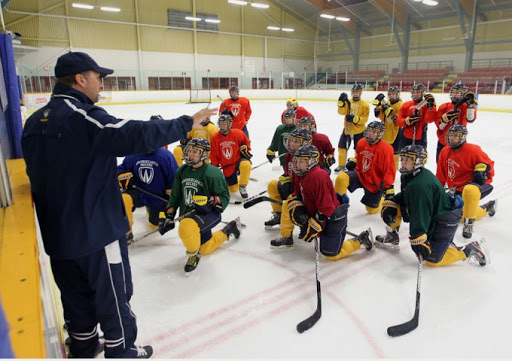Coaching a minor hockey team is a lot of work. It requires many hours, time away from family (unless your child is on the team), and a lot of dedication. Coaches are committed to improving their team and teaching individual skills to players, and often do far more work than just what appears at game time. Many things happen behind the scenes, and coaching takes up a lot more than just the few hours a week for practices and games.
At the higher levels, many coaches are rewarded monetarily for their dedication to the teams. However, there is no set standard for coach salaries, and some are not paid at all, though they do receive some league benefits such as extra ice time.
While we can’t blame coaches for being interested in compensation, there are many ethical concerns about it.
Parents Paying for Ice Time
In some cases, minor hockey coaches receive “donations” from parents for their time. This can lead to corruption and favoritism, with more affluent parents paying more so that their child can get more ice time. While not all coaches accept this form of compensation, it is still a problem that has been seen throughout many minor leagues. This makes it more difficult for certain players to improve their skillsets and to enjoy themselves during their time in the league.
Some would argue that giving the coaches a salary would deter this type of behavior. If they are making money from the league rather than depending on parents to cover their costs, then they will be less likely to accept these donations that can often be seen as a form of bribery.
Parent vs Non-parent coaches
Some leagues only pay non-parent coaches but offer parent coaches a few perks such as increased ice time and discounts on league specials. Generally, this is justified by the fact that the parents get to spend time with their kids, so it isn’t necessarily a job but rather a bonding event.
This can lead to disagreements between the parent and non-parent coaches, as parents may not see it as fair that others are being paid, even if they do have the benefit of being with their child. After all, everybody is doing the same work, and often the parents are even more dedicated to the team because of the presence of their kid.
On the other hand, an argument against paying parent coaches is that they may show favoritism towards their own kid and won’t offer as objective of an experience for the whole team. Paid coaches without a family connection to the team may provide a fairer playing experience.
Politics
Once you bring money into any situation, there are bound to politics involved. Coaches may be compensated differently across leagues, and this may cause arguments between coaches and league officials. These types of situations can lead to negative morale as a bitter coach may not put maximum effort into developing his team and getting to know his players.
Offering salaries for coaches also leads to a lot more back office work, as demands are bound to change over time with inflation and as equipment becomes more expensive. It is difficult to say whether or not this is worth it in the long run but is certainly something that leagues must consider when offering compensation.
Out-of-pocket Expenses
Hockey is a relatively expensive sport when compared to many others, and being a coach entails many expenses on its own, especially at the higher levels. Coaches often have to foot the bill for renting ice for practices, and they are usually required to pay for their own travel expenses. This turns many potential volunteer coaches off, as these bills can really add up.
Some leagues offer compensation in the form of reimbursed expenses. So, while the coach isn’t necessarily profiting off the league, he is at least not losing money on his venture. For those who are passionate about the game or simply want to spend time with their children on the team, this is often enough to forego any sort of salary or extra payment.
Time away from work
It is also important to consider the time that a coach may have to take off from his or her job in order to accommodate an intense travel or playing schedule. Not everyone can afford to leave work for a recreational activity, and many that do end up taking a reduction in pay due to working fewer hours.
This is an argument for paying coaches, as it is likely that more people will become interested in providing their services if there is some sort of compensation involved. With hockey being as expensive as it already is, potential coaches may make their final decision based on how much money they stand to lose or gain in taking on a coaching position.
Is payment ethical?
There is no right or wrong answer to this question. Volunteering as a coach can be a highly rewarding experience without monetary compensation, but it is certainly a major commitment. Offering some sort of payment, however, may entice more talented coaches into the league and make for a higher level of competition and education. It’s just that leagues need to be very careful about how they pay their coaches and how involved other parents get.
This requires a lot of monitoring of the activities of the team to ensure that nobody is using their payments to show favoritism or unfair treatment. This could cost the league even more money as they will need to hire officials who can stay on top of such situations.
Overall, as hockey schedules become more intense and coaching jobs more specialized, it is likely that more coaches are going to be getting paid for their time. They may not receive exorbitant amounts, but even just enough to cover their costs and make it worth their while may soon become the norm. This isn’t a bad thing, but care must be taken to ensure that their number one dedication remains to the players and not to their bank accounts.






